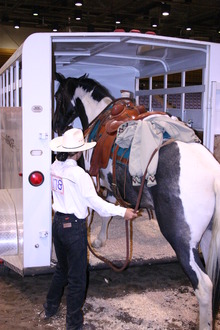No matter where horse owners live, it is more than likely that, given the developing weather patterns of the last few years and the natural disasters that occur, eventually, many, if not all equine owners will need to evacuate their horses and other large animals.

Practice makes perfect when trailer loading your horse
During hurricanes, earthquakes, wild fires, floods and other disasters, having a plan in place will save you time and money and possibly the lives of your horses.
© 2015 by Nancy Kerson
Whether it is floods, hurricanes, toronadoes, wild fires, or other catastrophic situations, disaster preparedness is important for all animals, but it takes extra consideration for horses because of their size and their transportation needs.
During an emergency, youâll have limited time to evacuate your animals. During hurricanes, earthquakes, wild fire, floods and other disasters, having a plan in place will save you time and money and possibly the lives of your horses.
With an effective emergency plan, youâre more likely to be able to move your horses to safety. If not, or you wait until the last minute to evacuate, emergency management officials may tell you that you must leave your horses behind.
Once you leave your property, you have no way of knowing how long you will be kept out of the area. Your horses could be unattended for days without care, food, or water.
Owners and rescue groups must make preparation a top priority. Here are five tips to remember â along with more information on what to do if these aren't feasible:
1. Plan
Decide where you will be sheltering your horse during the natural disaster and how you will get there, and then share that plan with everyone living in your home and anyone who may care for your horses in your absence. Make sure you have at least two routes to get to your evacuation site in case of road closures. Plan to begin transport as soon as authorities issue an evacuation of your area, if not before.
2. Prepare
Put together an evacuation kit for your horse that includes a checklist of what tack you will need to bring with you, paperwork proving your ownership and health of your horse (branding papers, microchip papers, photographs, veterinary records, Coggins test) and an emergency first aid kit. Consider teaming up with a neighbor for evacuation; pooling resources such as a trailers and supplies may make the process more efficient.
4. Teach
Teach your horse to load in your trailer under calm conditions, since you want him to be on autopilot in an emergency situation. Ideally you will practice loading your horse into the trailer in which you plan to evacuate him â and make sure your evacuation trailer has room for all your horses. Once inside the trailer, tie your horse or horses, to keep them from hurting themselves or others during transport.
5. Provide
Take at least one bale of hay and a bucket for water â more if you have multiple horses â as well as any special foods for senior and special-needs horses. You may not have immediate access to hay and buckets wherever you are sheltering your horse.
There may be times when taking your horses with you is impossible during an emergency. So you must consider different types of disasters and whether your horses would be better off in a barn or loose in a field.
Your local humane organization, agricultural extension agent, or local emergency management agency may be able to provide you with information about your communityâs disaster response plans.
